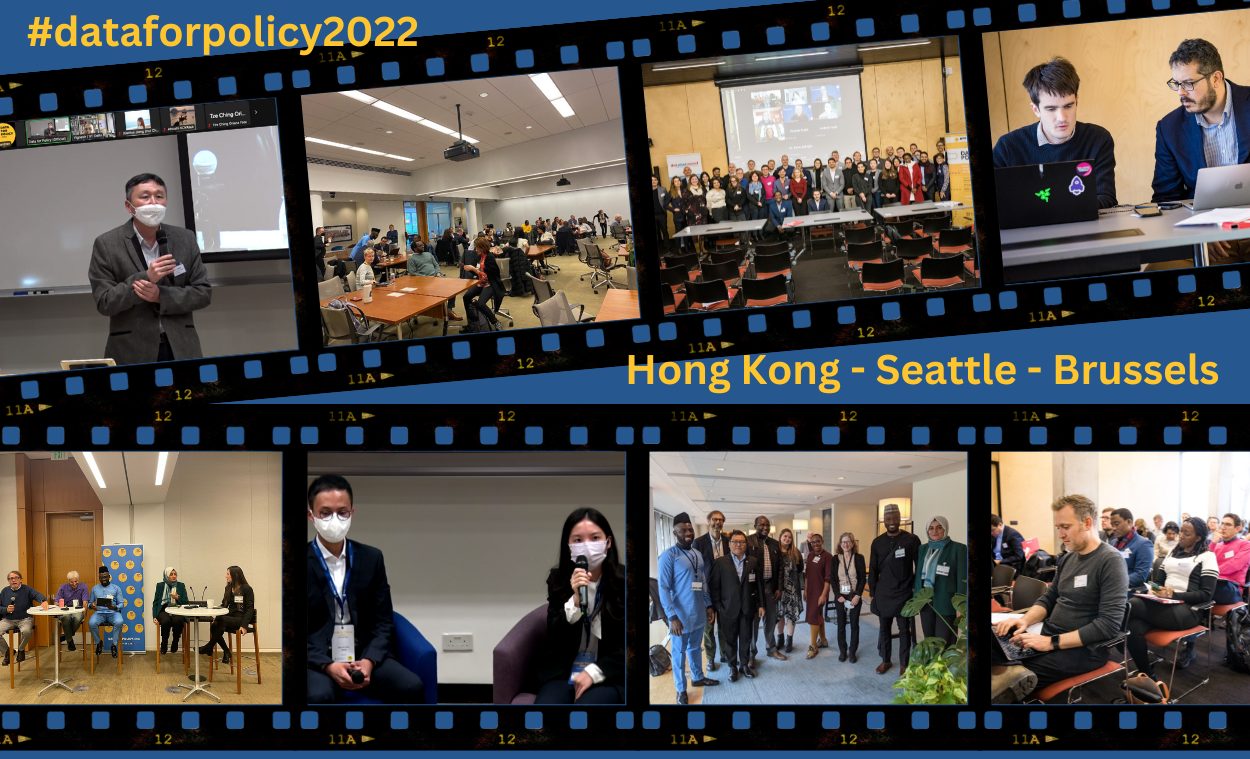Discussions about holding Data for Policy 2022 in three regions outside the UK started in January. After 11 months of planning, on December 5th, the 7th edition of the internationally-renowned conference was launched by Professor Masaru Yarime, at the Hong Kong University of Science and Technology. This was followed by events in Seattle, and conclusion in Brussels.
The conference organising team (Emily Gardner, Roy Cobby and Andrew Hyde) and the general chairs (Zeynep Engin, Jon Crowcroft and Stefaan Verhulst) were honoured to work with esteemed colleagues Masaru Yarime, Leigh Anderson (University of Washington) and Francesco Mureddu (The Lisbon Council), who acted as regional chairs in each location. Each regional chair convened a regional committee of experts, and together they steered the content of each programme. This included the many individual contributions received in response to our call for papers, which formed the backbone of each.
In Hong Kong, participants were treated to an insightful keynote lecture from Noboru Koshizuka (Tokyo University) entitled ‘Data-driven society: toward the democratization of innovation’ – a subject at the heart of the data for policy dialogue. A plenary panel of experts (Kira Matus, Hong Kong University of Science and Technology; Junseok Hwang, Seoul National University; and Sabrina Luk, Nanyang Technological University, Singapore) focussed on regional issues in ‘Facilitating Data-Driven Innovation: Opportunities and Challenges in Asia-Pacific’. Individual contributions were showcased in sessions including ‘Data, Emerging Technologies and Citizens’, ‘Political Economy of Data Policies and Strategies’ and ‘Governance and Management of Data-driven Innovations’.
The Seattle conference was generously supported by the Bill & Melinda Gates Foundation, who hosted a pre-conference event at their local campus. Shaida Baidee (Open Data Watch) and Stanley Wood (Bill & Melinda Gates Foundation) acted as hosts and moderators for three excellent panels. The discussion continued the next day, at the Evans School at the UW. Both events featured fascinating debates on different aspects of data, with panellists including Jake Effoduh (York University, Canada), Vin Gupta (UW, Amazon and NBC), Aylin Caliskan (UW), Natalia Carfi (Open Data Charter), Leah Tivoli (City of Seattle), Kayla Lar-Son (University of British Columbia) and Oscar Figueroa Rodriguez (COLPOS, Mexico). Carl Bergstrom (UW) delivered a topical keynote lecture on ‘Social media, Collective Decision-making, and the Stewardship of Global Information Flows’, and individual contributions covered the topics including ‘Citizen Data and Data Governance’ and ‘Data and methods to inform Covid lessons’.
The final instalment was hosted by the Vrije University of Brussels. The day started with a series of short ignition talks in plenary, before running a number of parallel sessions of individual contributions. Special track sessions included ‘The future of Border and external security: From Data to Policies’ and ‘Public data for private gain or public benefit? Debating the use of public sector data by private actors’. The Aapti Institute (India) ran a highly-engaging workshop on ‘Exploring the possibilities for citizen-generated data and governance models to shape sustainable cities and communities’. Gianluca Misuraca (Universidad Politécnica de Madrid) delivered the keynote lecture on ‘AI for delivering government services’. Emanuele Baldacci chaired a panel discussion on ‘Use of high value datasets for policy making’. The conference closed with a panel reflecting on the common themes and differences in the discussions across the three regions, with Barbara Ubaldi (OECD), Francesco Mureddu and general chairs Zeynep Engin (Founder and CEO, Data for Policy) and Stefaan Verhulst (Govlab).
We were very pleased to support both in-person attendance and virtual attendance of a number of participants in Seattle and Brussels through our inclusion scholarship programme. Here are some reactions from recipients:
- “Thank you for the scholarship support to attend in person such a great conference with the take-ways to transfer in practice back home”
- “Thank you very much for facilitating a wonderful conference and helping us attend the same in-person. We appreciate it and hope to continue this engagement with Data for Policy”
- “I want to say thank you for organizing this conference. Your support has helped me continue to expand my statistics research to the policy community”
This is part of a wider initiative of engagement funded by the Gates foundation, and we will publish more news on this in the new year.
The Data for Policy central organisation team would like to extend their heartfelt thanks to everyone who contributed to Data for Policy 2022, in particular our regional chairs, Masaru, Leigh and Francesco, our partner organisations HKUST, the Gates foundation, the Evans School at UW, the VUB and the Lisbon Council, all speakers and regional committee members. Finally, we’d like to highlight the vital contribution of local organisers and volunteers – delivering the conference was truly a team effort.

